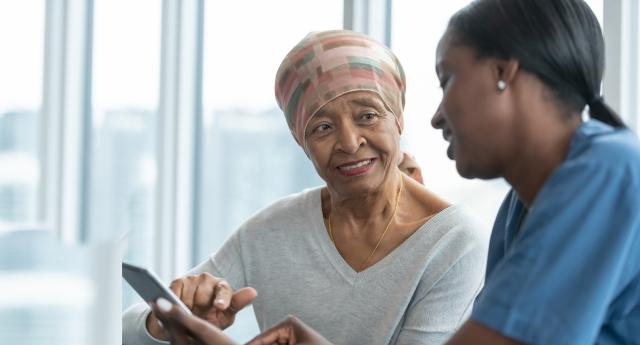
Health Equity in Action
Health Equity in Action
The time is long overdue to take what we have known about healthcare and cancer care disparities and convert that knowledge into action.
Underserved communities have endured a long history of disparate access to quality cancer care and a lack of culturally appropriate supportive care services. The Cancer Support Community is committed to reducing disparities associated with different cancer diagnoses. We are focused on creating solutions to improve health services and outcomes for communities whose members are disproportionately affected by cancer.
Welcome to our resource center focused on advancing health equity in cancer care. Access cancer disparity statistics, learn about our work to reduce cancer disparities, and explore our health equity resources and programs.
Cancer Disparities Toolkit
Are you looking for statistics about a cancer type or a population?
Justified Medical Mistrust:
Acknowledging the Past to Change the Future
You may have been offered participation in a clinical trial before, but wondered about why you might consider participating. Perhaps you have questions about the process or wonder if it will even make a difference in your cancer journey at all. CSC’s docuseries, “Justified Medical Mistrust: Acknowledging the Past to Change the Future,” addresses a variety of myths, truths, and concerns that Black and African American patients and their caregivers often experience when considering clinical trials as part of their care plan.
Watch Now:
Justified Medical Mistrust: Righting the Wrongs
We highlight events and personal experiences that contribute to mistrust of the medical community while learning about strategies, programs, and initiatives that individuals and institutions within our healthcare system have developed to earn trust…

Peer Clinical Trials Support Program
Learn more about clinical trials from a Black or African American clinical trial participant.
Resources & Programs
Navajo Nation Cancer Program
Get details about the first-ever cancer care facility we helped bring to U.S. tribal lands.

A New Model of Cancer Care
Learn about our new cancer center in Washington, D.C., and how it will address health equity challenges.

Glossary
All definitions courtesy of “Advancing Health Equity: A Guide to Language, Narrative and Concepts,”
a publication by the American Medical Association.
Health care disparities – Refers to a higher burden of illness, injury, disability, or mortality experienced by one group relative to another.
Health equity – Defined by the World Health Organization as “the absence of avoidable, unfair, or remediable differences among groups of people, whether those groups are defined socially, economically, demographically or geographically or by other means of stratification.”
Intersectionality – The ongoing examination of the overlapping systems of oppression and discrimination that communities face based on race, gender, ethnicity, ability, etc.
Privilege – A set of advantages systemically conferred on a particular person or group of people.
Social determinants of health – Refers to the underlying community-wide social, economic, and physical conditions in which people are born, grow, live, work, and age.
Health Equity Core Values
We strive to be an organization that not only upholds, but boldly proclaims, a commitment to diversity, equity, and inclusivity. From our programs to our educational materials, from our advocacy platforms to our research, from our direct care and digital footprint to our operations and culture, we know that our strength lies in our collective differences. To ensure that every step we take is a step towards establishing equity, we are guided by the following health equity values.
- Elevate Patient-Centered Care - Patients and caregivers are at the center of everything we do.
- Engage Diverse Communities - Engage diverse communities in all aspects of mission delivery.
- Affirm Intersectionality - Examine justice, power, and oppression through the overlapping, interconnected parts of one’s identity.
- Collaborate Strategically - Partner and collaborate with organizations that share our values and commitment to diversity, equity, and inclusion.
- Dismantle Inequities - Work to identify, disrupt, and eradicate systemic and structural racism in cancer care.
- Eliminate Disparities - Use a social determinants lens to increase access, improve affordability, and eliminate cancer disparities.
- Celebrate Multiculturalism - Diverse backgrounds, perspectives, and approaches strengthen our work and should be celebrated and elevated.
- Build Resourcefulness - Commit to educating ourselves and each other on history, race, privilege, and social justice.
- Practice Cultural Humility - Understand and recognize that this is a process of lifelong learning that requires us to continually listen, learn, and grow.

